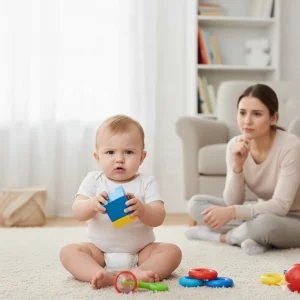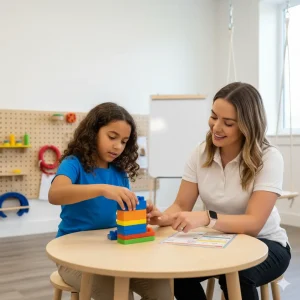Parenting Styles | Child Psychology
By Prapoorna M
Last Updated: November 27, 2021
A baby’s brain, spinal cord, heart and other organs begin to form by the fifth week of pregnancy. By the eighteenth week the nerve endings of a baby’s brain “hook up” to the ears, and she may hear the mother’s heart beating, and may even be startled (feeling or sudden shock or alarm) by loud noises. At this time, the mother may not yet perceive the baby moving, but she has actually started to do so. From then on, the baby’s motor and sensory functions progressively develop.
This early the baby in the womb can already recognize her mother’s voice. The mother can begin their bonding experience early by reading, singing or talking to her unborn child. Learning becomes a daily process from birth that can be influenced largely by a child’s parents. According to a neuroscientist from the University of California-Los Angeles, parent-child interaction can affect not only a child’s psychological development but her physical brain development as well.
The human brain has a remarkable capacity to change (plasticity), and timing may be crucial, when the brain at a young age is particularly efficient at specific types of learning.
Four Parenting Approaches
According to Maccoby & Martin, 1983, parents can be classified according to their level of parental demand and responsiveness which reflects different patterns of parental values, practices, and behaviors (Baumrind, 1991).
Indulgent Parenting Indulgent or permissive (allowing of excessive freedom of behavior) parents are more responsive than demanding. They are non-traditional, lenient, allow considerable self-regulation, and avoid confrontation (argument). These parents do not expect mature behavior from their children and often seem more like a friend than a parental figure.
Authoritarian Parenting
Authoritarian parents are highly demanding and directive (not sensitive to child’s conflicting viewpoint. Expect child to accept their judgements, values and goals without questioning. Will apply forceful measures to achieve control), not responsive, obedience-oriented and status-oriented, expect their orders to be obeyed and provide well-ordered and structured environments with clearly stated rules.
Authoritative Parenting
Authoritative parents are demanding and responsive (accepting and sensitive to their children’s emotional and developmental needs), assertive (to manage expectations and encourage and reward good and positive behavior), but not intrusive and restrictive. They use disciplinary methods that are supportive, rather than punitive (rather than punishment). They teach their children to be assertive, socially responsible, self-regulated and cooperative.
Neglectful Parenting
Uninvolved or neglectful parents are low in both responsiveness and level of demand. These parents are emotionally detached and indifferent and keep their children at a distance, responding to their child’s demands only to make them cease bothering them.

Effects of Parenting Styles
Most of the existing studies that investigate the connection between parenting styles and children’s cognitive development are comprised of families with adolescents. Parenting approaches include the authoritarian, permissive, authoritative and neglectful styles, which are compared in relation to different child outcomes, such as academic achievement, self-confidence, aggression, delinquent behavior and substance abuse.
In the different studies conducted among young adolescents in 1987 to 1998, similar results showed that authoritarian and permissive parenting styles were not associated with higher grades, while the authoritative parenting approach was more likely to be associated with higher grades. Little is known about the neglectful parenting style, and research on this is lacking because such parents are typically not very responsive or do not volunteer to be studied.
Another group of researchers (Tiller, et al) investigated the influence of authoritative, authoritarian and permissive parenting styles on elementary school-aged children’s cognitive ability, with the addition of socioeconomic demographic variables. Their findings indicated, however, that parenting styles are not better predictors of children’s cognitive ability than family socioeconomic-demographic characteristics.
The authors suggested that perhaps there are other factors that may affect cognitive development in young children such as the marital status of the parents, the child’s personal characteristics and the parents’ personalities. Furthermore, they proposed that parenting has a greater and more direct influence on other aspects of children’s development such as social and emotional development rather than on cognitive development.
These findings are supported by other observations that brain development may be affected by factors such as poverty, economic deprivation that affects their nutrition, access to medical care, the safety and predictability of their physical environment, the level of family stress experienced and the quality and continuity of their education.
Early Learning and Childcare
Children’s experiences in their early years are very closely related to the quality of care that they receive. We also know that these experiences can have a real impact on how children develop in the future. It is important that all those involved in the wellbeing, care and education of babies and young children provide an enriched environment in which children can thrive.
High-quality child care, pre-school and school education has a vital role to play in the successful implementation of The Early Years framework. Early learning environments and quality child care have a unique opportunity to adopt a holistic approach to young children’s learning, which responds to each child’s changing developmental needs and values the child’s prior knowledge from home and life experience.

What Does This All Mean?
A child’s brain development, including his intelligence, information processing, conceptual resources, perceptual skill, language learning and skills may be influenced by many factors. It may take more than just parenting skills to form a child’s abilities to process information, develop his skills in decision making and so on. Many other important aspects in a child’s life can influence his brain development, such as:
- Child’s state of health or disease
- The adequacy of the child’s nutrition
- Child’s social environment
- Child’s physical environment
- Child’s family’s socio-economic status
- Child’s family’s dynamics
- Child’s genetic make-up
Although parenting skills are important in raising motivated children, learning may be enhanced by many other factors that play a dynamic role in mental development. More research needs to be done. Furthermore, in doing such research, parameters indicating a child’s cognitive development should be more specific or measurable, rather than just based on their grades in school.
School performance may not be an accurate indicator of brain development since it can be influenced by personal and social factors.
Your parenting style can affect everything from how much your child weighs to how she feels about herself. It’s important to ensure your parenting style is supporting healthy growth and development because the way you interact with your child and how you discipline her will influence her for the rest of her life.
Parenting Styles
Researchers have identified four types of parenting styles:
- Authoritarian
- Authoritative
- Permissive
- Uninvolved
Each style takes a different approach to raising children, and can be
identified by a number of different characteristics.
Illustration by Joshua Seong
Authoritarian Parenting
Do any of these statements sound like you?
- Do you believe kids should be seen but not heard?
- When it comes to rules, do you believe it’s “my way or the highway”?
- Don’t you take your child’s feelings into consideration?
If any of that ring true, then you might be an authoritarian parent. Authoritarian parents believe that kids should follow the rules without exception. Authoritarian parents are famous for saying, “Because I said so,” when a child questions the reasons behind a rule. They are not interested in negotiating and their focus is on obedience. They also don’t allow kids to get involved in problem-solving challenges or obstacles.
Instead, they make the rules and enforce the consequences with little regard for a child’s opinion.
Authoritarian parents may use punishments instead of discipline. So rather than teach a child how to make better choices, they’re invested in making kids feel sorry for their mistakes. Children who grow up with strict authoritarian parents tend to follow rules much of the time. But, their obedience comes at a price.
Children of authoritarian parents are at a higher risk of developing self-esteem problems because their opinions aren’t valued. They may also become hostile (dislike) or aggressive. Rather than think about how to do things better in the future, they often focus on the anger they feel toward their parents. Since authoritarian parents are often strict, their children may grow to become good liars in an effort to avoid punishment.
Signs That You Are Too Strict With Your Child
Authoritative Parenting
Do any of these statements sound like you?
- You put a lot of effort into creating and maintaining a positive relationship with your child.
- You explain the reasons behind your rules.
- You enforce rules and give consequences, but take your child’s feelings into consideration.
If those statements sound familiar, you may be an authoritative parent. Authoritative parents have rules and they use consequences, but they also take their children’s opinions into account. They validate their children’s feelings, while also making it clear that the adults are ultimately in charge.
Authoritative parents invest time and energy into preventing behavior problems before they start. They also use positive discipline strategies to reinforce good behavior, like praise and reward systems. Researchers have found kids who have authoritative parents are most likely to become responsible adults who feel comfortable expressing their opinions. Children raised with authoritative discipline tend to be happy and successful. They’re also more likely to be good at making decisions and evaluating safety risks on their own.
Permissive Parenting
Do any of these statements sound like you?
- You set rules but rarely enforce them.
- You don’t give out consequences very often.
- You think your child will learn best with little interference from you.
If those statements sound familiar, you might be a permissive parent. Permissive parents are lenient. They often only step in when there’s a serious problem. They’re quite forgiving and they adopt an attitude of “kids will be kids.” When they do use consequences, they may not make those consequences stick. They might give privileges back if a child begs or they may allow a child to get out of time-out early if he promises to be good.
Permissive parents usually take on more of a friend role than a parent role. They often encourage their children to talk with them about their problems, but they usually don’t put much effort into discouraging poor choices or bad behavior. Kids who grow up with permissive parents are more likely to struggle academically. They may exhibit more behavioral problems as they don’t appreciate authority and rules. They often have low self-esteem and may report a lot of sadness.
They’re also at a higher risk for health problems, like obesity, because permissive parents struggle to limit junk food intake. They are even more likely to have dental cavities because permissive parents often don’t enforce good habits, like ensuring a child brushes his teeth.
Are You a Permissive Parent?

Uninvolved Parenting
Do any of these statements sound familiar?
- You don’t ask your child about school or homework.
- You rarely know where your child is or who she is with.
- You don’t spend much time with your child.
If those statements sound familiar, you might be an uninvolved parent. Uninvolved parents tend to have little knowledge of what their children are doing. There tend to be few rules. Children may not receive much guidance,
nurturing, and parental attention. Uninvolved parents expect children to raise themselves. They don’t devote much time or energy into meeting children’s basic needs.
Uninvolved parents may be neglectful but it’s not always intentional. A parent with mental health issues or substance abuse problems, for example, may not be able to care for a child’s physical or emotional needs on a consistent basis. At other times, uninvolved parents lack knowledge about child development. And sometimes, they’re simply overwhelmed with other problems, like work, paying bills, and managing a household.
Children with uninvolved parents are likely to struggle with self-esteem issues. They tend to perform poorly in school. They also exhibit frequent behavior problems and rank low in happiness. Uninvolved Parenting and Its Effects on Children. Sometimes parents don’t fit into just one category, so don’t despair if there are times or areas where you tend to be permissive and other times when you’re more authoritative.
The studies are clear, however, that authoritative parenting is the best parenting style. But even if you tend to identify with other parenting styles more, there are steps you can take to become a more authoritative parent. With dedication and commitment to being the best parent you can be, you can maintain a positive relationship with your child while still establishing your authority in a healthy manner. And over time, your child will reap the benefits of your authoritative style.
Book your Free Consultation Today
Parent/Caregiver Info:
Client’s Details:
* Error Message









